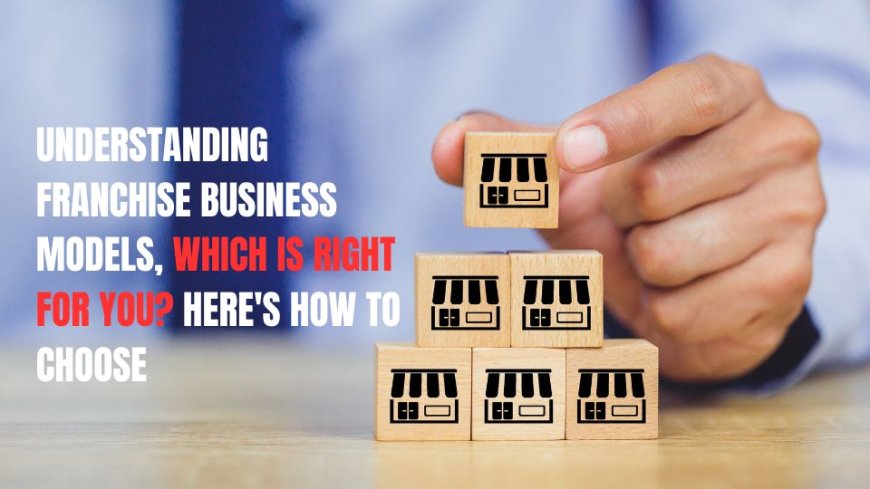Understanding Franchise Business Models, Which is Right For You? Here's How to Choose
Franchising has become an increasingly popular route for entrepreneurs looking to start their own businesses with the support and established brand recognition of a larger entity.

However, when choosing the right franchise, it's essential to understand the two primary business models that franchises generally fall under: brick-and-mortar and service-based. Each model has its characteristics, investment requirements, and operational nuances. This article will delve into the key differences between these models, helping you make a more informed decision when considering a franchise opportunity.
1. Investment Cost: Real Estate Drives the Investment
One of the most significant factors distinguishing brick-and-mortar franchises from service-based franchises is the investment cost, largely driven by real estate requirements.
Brick-and-mortar franchises typically involve setting up a physical retail space where customers visit to receive services. This category includes businesses like hair salons, fitness studios, and restaurants.
The investment costs here are considerably higher due to the need for customer-facing real estate. For instance, a fitness studio would require a well-equipped facility with machines, a sound system, changing rooms, and showers. Beyond equipment, there are also costs related to interior design, flooring, and overall architecture.
Service-based franchises, on the other hand, often do not require a physical retail location. Instead, these businesses provide services at the customer's location. Examples include lawn care companies, moving services, and HVAC repair services. These franchises may operate from a home office or require only a small industrial space to store vehicles and equipment.
Since they don't need high-profile real estate, the initial investment is significantly lower. The focus is more on the tools and vehicles necessary to perform the service rather than on customer-facing spaces.
Investment Ranges: While these ranges are not definitive, brick-and-mortar franchises generally require a higher upfront investment, potentially ranging from $250,000 to over a million dollars, depending on the location and brand. Service-based franchises might start with investments as low as $50,000, depending on the nature of the service and the necessary equipment.
2. Ramp-Up Time: The Journey to Positive Cash Flow
Ramp-up time refers to the period it takes for a business to reach a stable, positive cash flow and establish a reliable customer base. This timeline is closely linked to the initial investment cost and the nature of the business.
For Brick-and-Mortar Franchises, the ramp-up time tends to be longer. The reasons are straightforward: the high upfront investment in real estate and build-out means it can take time to recoup these costs. Additionally, establishing a strong, repeat customer base in a fixed location is a process that can take months, if not years. For instance, a hair salon may require substantial time to build a loyal clientele, and in the interim, the business must cover high fixed costs like rent, utilities, and staffing.
In contrast, Service-Based Franchises often experience a quicker ramp-up. With lower initial overhead and investment, these businesses can start generating positive cash flow sooner. A moving service, for example, can begin operations almost immediately after acquiring the necessary vehicles and staff. As the business grows, month-over-month operational costs remain closely linked to revenue, making it easier to scale up operations and achieve profitability.
Example: A moving service might see positive cash flow within a few months, depending on the demand in the area, while a brick-and-mortar fitness studio might take a year or more to achieve the same financial stability.
3. Scalability: Expanding Your Franchise Empire
Scalability is another critical factor when choosing between a brick-and-mortar and a service-based franchise. The ability to grow your business efficiently can significantly impact long-term success.
Brick-and-mortar franchises are often more scalable in a traditional sense. Once a franchisee has successfully established one location, they can use their experience and systems to open additional locations. These new locations can benefit from shared marketing, supply chains, and brand recognition, allowing for economies of scale. However, each new location requires a significant capital investment, similar to the initial franchise, as each one needs its own real estate, build-out, and staffing.
On the other hand, Service-Based Franchises scale differently. Instead of opening additional physical locations, these businesses often expand by increasing their service territory. For instance, a lawn care service can purchase additional territories within a region, expanding its customer base without the need for new storefronts. While this expansion isn’t without costs (additional vehicles, employees, equipment maintenance), the investment is more incremental and can be more closely tied to revenue growth.
Scalability Example: A service-based pest control franchise can expand its operations to cover more neighborhoods or towns with relatively low incremental investment, whereas a fitness studio franchise would need to invest heavily in each new location.
4. Technology: Equalizing the Playing Field
In today’s business environment, technology plays a crucial role in the success of both brick-and-mortar and service-based franchises. However, its application can vary depending on the business model.
Brick-and-mortar franchises often rely on technology to streamline operations and improve customer experience. For instance, a fitness studio might use an online booking system for classes, automated billing for memberships, and digital marketing to attract new clients. Technology can also be used to manage inventory, track customer preferences, and enhance in-store experiences through digital kiosks or apps.
Service-based franchises also benefit from technology, but their focus is often on operational efficiency rather than in-store experiences. For example, a lawn care company might use software to schedule appointments, dispatch teams, and track job progress in real time. Customers can book services online, receive digital invoices, and provide feedback through apps, enhancing their overall experience.
Technology Example: Both a hair salon and a plumbing service can benefit from online booking systems, but while the salon may use technology to create an immersive in-store experience, the plumbing service uses it to optimize scheduling and service delivery.
5. Location Risk: The Role of Real Estate in Success
Location risk is a crucial consideration, particularly for brick-and-mortar franchises. The success of these businesses often hinges on their physical location and its accessibility to customers.
Brick-and-mortar franchises depend heavily on foot traffic and convenience. A poorly chosen location can significantly impact the franchise's success, making site selection a critical step. For example, a hair salon located in a busy shopping district might thrive, while one tucked away in a less-trafficked area might struggle to attract customers. The challenge lies in finding a location that balances affordability with visibility and accessibility.
In contrast, Service-Based Franchises have much lower location risk. Since the service is provided at the customer’s location, the physical location of the franchise headquarters is less critical. These businesses can operate from less expensive, industrial areas without affecting customer acquisition. The key to success lies in market penetration rather than real estate selection.
Location Risk Example: A fitness studio must be in a location that customers can easily access, ideally close to where they live or work. Meanwhile, a pest control service can operate out of a small office on the outskirts of town, as their business is conducted at customers’ homes.
6. Recession Resistance: Weathering Economic Downturns
Finally, recession resistance is an important factor to consider, especially given the cyclical nature of economies. The type of services a franchise provides can determine how well it withstands economic downturns.
Brick-and-Mortar Franchises often provide discretionary services. For example, while getting a haircut or attending a yoga class is a regular part of life, these are services that people might cut back on during tough economic times. This can make brick-and-mortar franchises more vulnerable during recessions.
Service-Based Franchises, however, frequently offer essential services that are less affected by economic downturns. For instance, services like plumbing, HVAC repair, or lawn care are necessary regardless of the state of the economy. This makes service-based franchises more recession-resistant, as demand for essential services remains relatively stable even during economic slowdowns.
Recession Resistance Example: During a recession, customers might forgo regular visits to a nail salon but will still call a plumber if their pipes burst.
Conclusion: Choosing the Right Franchise Model
When it comes to franchising, there is no one-size-fits-all model. The choice between a brick-and-mortar and a service-based franchise depends on various factors, including your financial capabilities, risk tolerance, desired speed of growth, and long-term business goals.
Brick-and-Mortar Franchises: Ideal for those who can afford a higher initial investment and are looking for a stable, long-term business with the potential for multiple physical locations. While they may take longer to ramp up, they can offer strong, repeat customer bases and are scalable through additional storefronts.
Service-Based Franchises: Suitable for entrepreneurs looking for a lower upfront investment and a quicker path to profitability. These franchises offer flexibility in operations, lower location risk, and often greater resilience during economic downturns. They scale through territory expansion rather than physical locations.
By understanding these core differences, you can align your franchise choice with your business objectives, ensuring that your investment in a franchise model is both informed and strategic. Whether you’re drawn to the tangible presence of a brick-and-mortar location or the flexible operations of a service-based business, franchising offers a pathway to entrepreneurship that can be tailored to suit your unique vision and goals.

